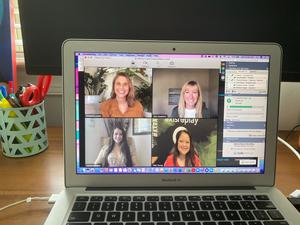More than six months after the first case of Covid-19 was diagnosed on U.S. soil, startups and tech companies around the country have had to shift into crisis mode.
What does innovating during a crisis look like? It's different depending on your industry, size, team and customer base, but for these Atlanta startups, giving up wasn't an option.
Some unique challenges for Atlanta during the pandemic have been the effects of the travel slowdown (the city’s airport is the busiest in the world), stress on one of the largest supply chain and logistics districts in the country and providing resources for the number of health care workers and essential personnel working at the city's hospitals. So how are these startups handling it? Let’s hear it from the founders themselves.
SitterTree
For Jody Stephenson with Atlanta-based babysitting app SitterTree, it was pivoting not once but twice during the pandemic.
At the beginning of the year, Stephenson said the company had reached its highest number of jobs and she had made an offer to a senior-level marketing director. Two hours later, the pandemic was announced.
When the first wave of cases hit the country, hundreds and hundreds of sitter jobs for college students on SitterTree were being cancelled. As a solution and a way to support local health care workers, Stephenson connected with Piedmont Health Care to provide child care for essential medical professionals around Georgia. The move forced SitterTree to rebuild their client base from the ground up, she said.
"We started recruiting and on-boarding child sitters throughout the whole state," she said.
But after the initial rush of panic and chaos surrounding the pandemic subsided, hospitals that SitterTree had partnered with started providing their own resources and childcare for employees.
"That completely dropped off at the end of May," she said. "Again, I thought, 'Oh my gosh. What are we going to do?'"
June brought in the lowest number of sitter jobs SitterTree had seen in years, Stephenson said. What's a founder to do?
Stephenson said she started noticing in many Facebook groups for parents and mothers that there was anxiety about their children returning to school, whether they would need to be homeschooled and how parents would juggle childcare while working full-time.
"[They were] very concerned about their children's education," Stephenson said. "We pivoted there to provide learning assistants."
Specifically, working mothers were concerned about keeping their children engaged in learning while working at home themselves, Stephenson said.
"[Parents] can't be literally sharpening a pencil and helping a child receive a password while on Zoom meetings for work," she said.
One parent even pointed out to Stephenson that her child's emotional needs during a tumultuous time in their development superseded his learning needs. With SitterTree, parents can find teaching assistants who can help their children with their learning and address those emotional needs.
"For us, that's where I had the 'a-ha' moment that SitterTree could fill a very important role beyond just academics," she said.
Since launching learning assistants, Stephenson said the company has seen an overwhelming demand for registration as kids head back to school, either virtually or physically. The company is still in conversations with hospital networks in Atlanta and other cities to see if they can provide resources to parents, she said.
"Our new marketing director did not anticipate having to start from ground zero two times in his first six months of working," she said. "We are rebuilding the entire business the second time over. It's been a roller coaster."
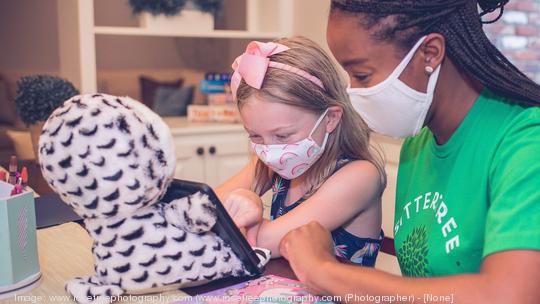
Sock Fancy
Though Sock Fancy was a successful sock subscription startup for more than seven years, socks aren't exactly an essential need during a pandemic.
Co-founder and CEO Stefan Lewinger said the corporate partnerships and collaborations that were Sock Fancy's bread and butter essentially froze overnight.
Each Sock Fancy mask is equipped with a metal nose band, adjustable ear straps, a filter and clothe suitable for baby skin. Sizes range from adult to kid sizes.
Lewinger said he and his team started to realize the vital need for PPE and masks during the pandemic, not only for health care workers but for the general public. Thus, a pivot was born.
"We knew we really had a tight relationship with our manufacturers, so that was really our 'A-ha!' moment to switch gears and start producing (masks,)" he said.
From that pivot in March, Sock Fancy sold 250,000 masks since April and donated more than 100,000 masks for free to support essential workers and health care professionals. Lewinger said they've sold to the general public, in addition to creating corporate masks for more than 400 businesses and enterprise clients such as Hardy's, Peachtree Orthopedics and even the Department of Defense.
The most important part about the pivot was helping others, Lewinger said; for every mask purchased, one will be donated to a health care or essential worker.
"We were just floored by the response," he said.
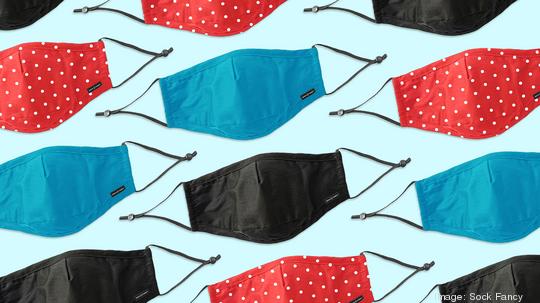
Motus Nova
Motus Nova was utilizing telehealth long before the pandemic set in. The health device and telehealth startup, which designed orthopedic devices for stroke patients to practice physical therapy and increase mobility at home, still had its fair share of challenges thanks to the red tape of health insurance.
Prior to the pandemic, founder David Wu said that the telehealth aspect of his company was for convenience of stroke patients, their caretakers and physical therapists. But when Covid-19 came around, it became a necessity. Not only were many physical therapy offices closed down but stroke patients are at-risk for more severe complications from the disease. Some patients had to pay up to $4,000 annually if their insurance didn't cover their telehealth therapy with Motus Nova.
"As Covid happened, we saw a dramatic shift in health care coverage, to encourage the use of telehealth," Wu said. "To us, it seemed like in slow motion. It happened in a couple of days, in a matter of weeks. [We went from] a $4,000 annual device to being completely covereing through telehealth across all insurance agencies at no additional cost... Their copays are even waived."
Now more than ever, Motus Nova is able to reach patients and shipout devices as quickly as possible. The company has two types of devices: one for upper extremities (such as an arm or wrist ailment) and one for lower extremities.
"It’s really like a coach, it’s like a personal trainer to help somebody who has movement impairments who need to go through physical therapy," Wu said. "With our case with telehealth, we’re recreating that entire experience, to simulate and to move their patients as if they were there in person."
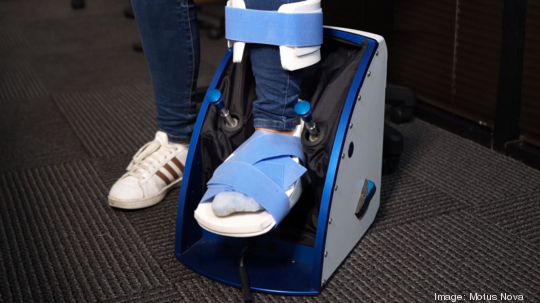
Roadie
Roadie, an Atlanta-based startup that “connects people with stuff to send with drivers already heading in the right direction,” knows how important delivers are. Now, add a virus, severe need for personal protection equipment, essentials and medical supplies, and an overcrowded supply chain and you’ve got a crisis on your hands.
“Demand for online shopping has absolutely exploded. We’re seeing intense demand for Roadie’s services -- especially in essential industries like grocery, pharmacy and home improvement, but in many other verticals, too," Marc Gorlin, founder and CEO of Roadie, said. "Organizations of all kinds are approaching us now, though; sports goods, fashion, you name it."
During the pandemic, Roadie, which has more than 150,000 verified drivers that can deliver same-day delivery to 89% of U.S. households, positioned itself to help both large- and small-scale retailers during a challenging time. Since the pandemic began, Roadie's largest retail clients have seen increases in weekly deliveries up to 1,400%, Gorlin said. Within two months, Roadie launched same-day delivery for more than 3,000 new store locations across the country.
"Foot traffic to brick-and-mortar businesses has fallen off a cliff, and same-day delivery has quickly become one of the most effective ways for companies to meet their customer where they are -- and where they are is at home," he said. "That’s where Roadie comes in."
Some of those businesses and brands Roadie has helped include:
- Tractor Supply: 364% increase in stores serviced by Roadie; 1,462 stores added in 10 days; 100% store coverage
- Home Depot: 100% increase in stores serviced by Roadie; 500% increase in demand
- Michael’s: 500% increase in demand; 1,250 stores added to the Roadie footprint in less than one week
- Advanced Auto Parts: 200-plus stores added Roadie delivery service in less than four weeks, leading to $1 million in same-day delivery orders in two weeks
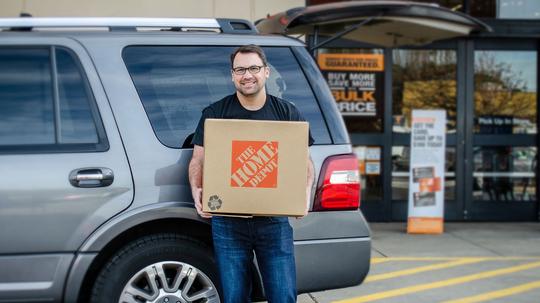
Softgiving
Charities and nonprofits around the country are experiencing a significant loss thanks to the lack of in-person charitable event. Softgiving, an Atlanta-based startup that with microdonations, is trying to solve that pressing issue for the nonprofit space. Earlier this month, The American Cancer Society said donations to the nonprofit in 2020 are about half of what they usually are. Softgiving founder and CEO Matt Pfaltzgraf said the startup is working with Atlanta-based CARE and Make a Wish to help raise money digitally as a way around in-person fundraisers.
But the startup isn't stopping with charities; anyone, from a nonprofit to an influencer to someone who has a cause they're passionate about, can now start a digital campaign with Softgiving. Doners can make micro-donations by rounding up to the nearest dollar on their recent purchases or donating as little or as much as they wish.
The startup has partnered with a number of gamers and celebrities for esports events to garner donations from Covid-19 relief over the last six months. In March, FIFA streamer Castro joined Softgiving to raise more than $200,000 in 28 hours during an online event for Covid-19 relief.

